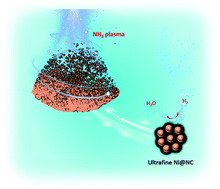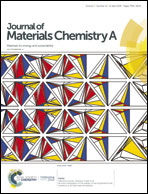Plasma modification of a Ni based metal–organic framework for efficient hydrogen evolution†
Abstract
Thermal decomposition of metal–organic frameworks (MOFs) is widely used to prepare metal catalysts for various applications. In most cases, severe metal agglomeration occurs due to the high decomposition temperature, which causes loss of active catalytic sites. In this work, we report a distinct decomposition pattern of a Ni based MOF (Ni MOF-74) in low temperature NH3 plasma. Ni MOF-74 grown on Ni foam is converted into a monolithic electrode with a carambola-like hierarchical 3D structure composed of ultrafine Ni nanocrystals (only 2.5 nm in diameter) encapsulated in a thin layer of N-doped carbon. The unique structure is attributed to the combination of highly reactive N species and the low thermal effect of low temperature NH3 plasma. High catalytic performance for the hydrogen evolution reaction from water electrolysis is demonstrated for this MOF-derived catalyst, which is applied in a solar cell driven water electrolysis-hydrogen fuel cell system.



 Please wait while we load your content...
Please wait while we load your content...